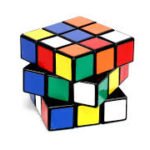 My son recently purchased a Rubik’s Cube. Have any of you ever solved one of those? We probably are all familiar with the concept of this classic toy. A six-sided multicoloured cube gets mixed up and you have to try to put all the colours back together. I remember having one as a kid. I never solved it. That being said, I never knew that there were actually rules which govern how one solves the cube. Apparently, there is a correct and incorrect way in which you orient the cube. Also, the relations of the colours to each other are very specific (i.e., you must know that white is opposite of yellow). There are even algorithms which govern how you get a coloured square from one location to another location (see http://www.wikihow.com/Solve-a-Rubik’s-Cube-with-the-Layer-Method).
My son recently purchased a Rubik’s Cube. Have any of you ever solved one of those? We probably are all familiar with the concept of this classic toy. A six-sided multicoloured cube gets mixed up and you have to try to put all the colours back together. I remember having one as a kid. I never solved it. That being said, I never knew that there were actually rules which govern how one solves the cube. Apparently, there is a correct and incorrect way in which you orient the cube. Also, the relations of the colours to each other are very specific (i.e., you must know that white is opposite of yellow). There are even algorithms which govern how you get a coloured square from one location to another location (see http://www.wikihow.com/Solve-a-Rubik’s-Cube-with-the-Layer-Method).
Here is what I find interesting – if you simply attempt to use the Rubik’s cube without knowing or abiding by the algorithms, simply turning the cube this way and that, you will always end in chaos. The colours will be continually mixed up and you will never actually solve the cube. But if you know the rules, and abide by the rules, then the task of solving the Rubik’s cube becomes tangible – and possibly fun.
We don’t like to talk a lot about rules in our day. Rules sound so oppressive, so top-down, so lifeless. Yet what of algorithms? Could we not use the language of algorithms to speak about issues which naturally arise in our spiritual lives? Just as certain mathematical principles govern the use of the Rubik’s cube, there are certain realities intrinsic to our devotional lives with Christ. We heard Paul refer to some of them in our Colossians reading on Sunday. Thus Paul writes ‘Put to death, therefore whatever belongs to your earthly nature: Sexual immorality, impurity, lust, evil desires, and greed.” Later in the passage he refers to “anger, rage, malice, slander, filthy language from your lips. Do not lie to each other.” Such behaviour has no place in our lives.
 The fact of the matter is, certain behaviour and actions leave us in spiritual chaos and rob us of our spiritual livelihood. They disrupt the life we are created to have, and the self we are created to be. Paul links these things to Idolatry – the act of following a false god. It is as if we take a well-ordered Rubik’s cube and begin to twist it around. The place we end up is disarray. So too spiritually. The Psalms are filled with constant pleas by individuals and communities to be ‘washed’, ‘cleansed’, ‘restored’, ‘freed’, and ‘revived’. Such cries give voice to a spiritual existence that has missed its mark; a spiritual life that has become all twisted around and needs to be placed back in order.
The fact of the matter is, certain behaviour and actions leave us in spiritual chaos and rob us of our spiritual livelihood. They disrupt the life we are created to have, and the self we are created to be. Paul links these things to Idolatry – the act of following a false god. It is as if we take a well-ordered Rubik’s cube and begin to twist it around. The place we end up is disarray. So too spiritually. The Psalms are filled with constant pleas by individuals and communities to be ‘washed’, ‘cleansed’, ‘restored’, ‘freed’, and ‘revived’. Such cries give voice to a spiritual existence that has missed its mark; a spiritual life that has become all twisted around and needs to be placed back in order.
Of course, holy algorithms aren’t all negative. This isn’t just about knowing what we are not to do. Paul’s letter to the Colossians does specify what it means to live the Christ-like life, or as he terms it, a life ‘hidden with Christ in God’. We are called to compassion, kindness, humility, love, peace forgiveness, and many other Christ-like attributes. We could also point to the beatitudes, the golden rule, or Micah 6:8 as other examples of holy algorithms. Unless we are cultivating behaviour modelled by the Lord, can we really say we are walking in the way of Jesus?
 So where do we start? Well, we start in the same place the Rubik’s cube starts: the cross. For the Rubik’s cube, it is the cross that allows all the other algorithms to work. It is the cross that begins the work of putting everything in order. Our spiritual lives, no matter how many twists and turns we give it, must be rooted in the work of Jesus on the cross. After all, Paul basis all his words regarding holy algorithms on the new life that we have received through Jesus. Our spiritual lives will only be truly right when we have hearts and minds set upon Jesus Christ. A right ordered spiritual life is when we do all things, in word or deed ‘In the name of the Lord Jesus Christ.’ The cross is not simply the symbol of Jesus’ death and resurrection, it becomes the ground for which all the activity of our lives are based upon.
So where do we start? Well, we start in the same place the Rubik’s cube starts: the cross. For the Rubik’s cube, it is the cross that allows all the other algorithms to work. It is the cross that begins the work of putting everything in order. Our spiritual lives, no matter how many twists and turns we give it, must be rooted in the work of Jesus on the cross. After all, Paul basis all his words regarding holy algorithms on the new life that we have received through Jesus. Our spiritual lives will only be truly right when we have hearts and minds set upon Jesus Christ. A right ordered spiritual life is when we do all things, in word or deed ‘In the name of the Lord Jesus Christ.’ The cross is not simply the symbol of Jesus’ death and resurrection, it becomes the ground for which all the activity of our lives are based upon.
Algorithms for Holy living help us live our lives in devotion and faithfulness. When our lives are tempted to get twisted around, these holy rules help us twist the cube of our spiritual lives back to the presence of work of Jesus. This is not always easy. We can get pretty twisted up sometimes. But salvation is never withdrawn. We are never beyond the work of grace. There is always forgiveness, and more to the point, there e is always the presence of the one who knows our spirits far better than we do, and is open heal and restore.

By Ginger Lora August 9, 2016 - 8:39 am
GOD have mercy on me……Let us keep our eyes on Christ …Heb 12:1 to 3
By Brooke Sales-Lee August 9, 2016 - 11:39 am
It appears this is leading to a 502 error, bad gateway.
By The Anglican Church of Canada August 9, 2016 - 12:39 pm
Brooke, there may have been a blip in the system during some server maintenance. It seems to be working for us now.